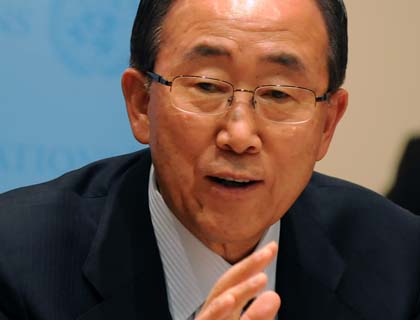VIENNA - Afghanistan cannot be stable while its economy depends so heavily on the drugs trade, and its allies must step up the fight to combat the industry, U.N. Secretary General Ban Ki-Moon said on Thursday.
Opening a major international conference on ways to combat narcotics production in Afghanistan and smuggling through neighboring states, Ban said the problem undermined efforts to help Afghanistan emerge as a normally functioning economy.
"We cannot speak of sustainable development when opium production is the only viable economic activity in the country," he told delegates of the so-called Paris Pact Ministerial Conference, which first met in 2003.
"We cannot expect stability when 15 percent of Afghanistan's gross domestic product comes from the drugs trade."
The Vienna conference, with participants from more than 50 countries and international organizations including the foreign ministers of Russia and France, was due to adopt a new declaration at the end of a one-day session.
With foreign combat forces, and much of their cash and air power, expected to be gone from the country by the end of 2014, the Afghan government will need more help fighting poppy cultivation, which rose over the last year, experts say.
"Despite continued efforts by the international community and major achievements, the problem of illicit traffic in opiates continues to be of serious concern," the draft Vienna Declaration said.
"Illicit traffic in opiates, including heroin, is a growing problem, generating illicit financial flows, fuelling corruption and organized crime and in some cases funding terrorist activities and insurgency."
The poppy economy in Afghanistan, which provides an income for insurgents in the country blighted by decades of war, has grown significantly in 2011 with soaring prices and expanded cultivation, a U.N. report said late last year.
Land under poppy cultivation climbed 7 percent from 2010 as farmers sought to capitalize on a sharp rise in opium prices caused by an unidentified disease, the report by the U.N. drugs agency and Afghanistan's counter-narcotics ministry said.
Three provinces in the north and east of the country that had been declared "poppy-free" have returned to production, it said. Opium is a thick paste from poppy that is processed into heroin.
Ban said export earnings from Afghan opiates may be worth as much as $2.4 billion.
"Above all, the Afghan government must prioritize the issue of narcotics," he said, according to a copy of his speech.
An initiative in Helmand province - a carrot-and-stick approach to stopping poppy growing which involved giving out food seeds and fertilizer - was a good example of government efforts, but more can be done.
"Law enforcement agencies must work harder on eradicating crops, eliminating laboratories, keeping precursors from entering the country and inhibiting drug trafficking." (Reuters)

